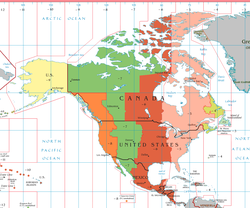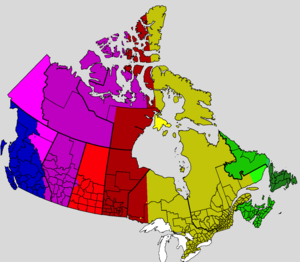This article needs additional citations for verification. (March 2008) |


| Standard | DST | Time zone | |
|---|---|---|---|
| UTC−03:30 | UTC−02:30 | Newfoundland | |
| UTC−04:00 | UTC−03:00 | Atlantic | |
| UTC−04:00 (year round) | Atlantic | ||
| UTC−05:00 | UTC−04:00 | Eastern | |
| UTC−05:00 (year round) | Eastern | ||
| UTC−06:00 | UTC−05:00 | Central | |
| UTC−06:00 (year round) | Central | ||
| UTC−07:00 | UTC−06:00 | Mountain | |
| UTC−07:00 (year round) | Mountain | ||
| UTC−08:00 | UTC−07:00 | Pacific | |
The Canadian province of Saskatchewan is geographically in the Mountain Time Zone (GMT−07:00). However, most of the province observes GMT−06:00 year-round. As a result, it is on daylight saving time (DST) year-round, as clocks are not turned back an hour in autumn when most jurisdictions return to standard time.
The city of Lloydminster and several small communities around Lloydminster are the only exceptions to this arrangement. Located partly in Saskatchewan and partly in Alberta, Lloydminster observes Mountain Time year-round, and it changes its clocks forward to Mountain Daylight Time each summer. The smaller communities around the city that also change time include Marsden, Neilburg, Marshall, Lashburn and Maidstone. Because of this, the time in Saskatchewan is the same in all parts of the province during summer months only.
During the summer, clocks in the entire province match those of Calgary, Edmonton and Denver. During the winter, clocks in most of the province outside Lloydminster match those of Winnipeg and Chicago.